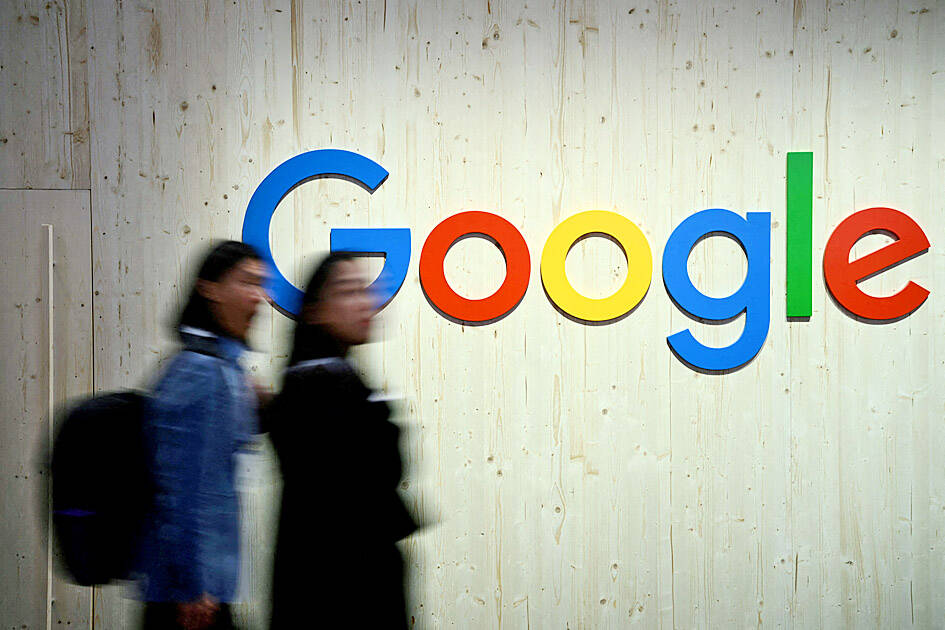Google yesterday won a court challenge against a 1.49 billion euro (US$1.66 billion) EU antitrust fine imposed five years ago that targeted its online advertising business.
The EU’s General Court said it was throwing out the 2019 penalty imposed by the European Commission, which is the 27-nation bloc’s top antitrust enforcer.
“The General Court annuls the Commission’s decision in its entirety,” the court said in a news release.

Photo: Reuters
The commission’s ruling applied to a narrow portion of Google’s ad business: Ads that the US tech giant sold next to Google search results on third-party Web sites.
Regulators had accused the Alphabet Inc unit of inserting exclusivity clauses in its contracts that barred these Web sites from running similarly placed ads sold by Google’s rivals. The commission said when it issued the penalty that Google’s behavior resulted in advertisers and Web site owners having less choice and likely facing higher prices that would be passed on to consumers.
However, the court said the commission “committed errors” when it assessed those clauses. The commission failed to demonstrate that Google’s contracts deterred innovation, harmed consumers or helped the company hold on to and strengthen its dominant position in national online search advertising markets, it said.
The ruling can be appealed, but only on points of law, to the EU’s Court of Justice, the bloc’s top court.
The commission said in a brief statement that it would carefully study the judgement and reflect on possible next steps.
Google said it changed its contracts in 2016 to remove the provisions in question, even before the commission imposed its decision.
“We are pleased that the court has recognized errors in the original decision and annulled the fine,” Google said in a statement. “We will review the full decision closely.”
The company’s legal victory comes a week after it lost a final challenge against a separate EU antitrust case for its shopping comparison service that also involved a hefty fine.
They were among three antitrust penalties totaling about 8 billion euros that the commission imposed against Google in the previous decade. The penalties marked the beginning of an era of intensifying scrutiny for tech companies.
Google has faced escalating pressure on both sides of the Atlantic over its digital ad business. It is battling the US Department of Justice in a US federal court over allegations that its dominance over the technology that controls the sale of billions of Internet display ads constitutes an illegal monopoly.
UK competition regulators this month accused the company of abusing its dominance in the country’s digital ad market and giving preference to its own services.
EU antitrust enforcers carrying out their own investigation suggested last year that breaking up the company was the only way to satisfy competition concerns about its digital ad business.

SECTOR LEADER: TSMC can increase capacity by as much as 20 percent or more in the advanced node part of the foundry market by 2030, an analyst said Taiwan Semiconductor Manufacturing Co (TSMC, 台積電) is expected to lead its peers in the advanced 2-nanometer process technology, despite competition from Samsung Electronics Co and Intel Corp, TrendForce Corp analyst Joanne Chiao (喬安) said. TSMC’s sophisticated products and its large production scale are expected to allow the company to continue dominating the global 2-nanometer process market this year, Chiao said. The world’s largest contract chipmaker is scheduled to begin mass production of chips made on the 2-nanometer process in its Hsinchu fab in the second half of this year. It would also hold a ceremony on Monday next week to

TECH CLUSTER: The US company’s new office is in the Shalun Smart Green Energy Science City, a new AI industry base and cybersecurity hub in southern Taiwan US chip designer Advanced Micro Devices Inc (AMD) yesterday launched an office in Tainan’s Gueiren District (歸仁), marking a significant milestone in the development of southern Taiwan’s artificial intelligence (AI) industry, the Tainan City Government said in a statement. AMD Taiwan general manager Vincent Chern (陳民皓) presided over the opening ceremony for the company’s new office at the Shalun Smart Green Energy Science City (沙崙智慧綠能科學城), a new AI industry base and cybersecurity hub in southern Taiwan. Facilities in the new office include an information processing center, and a research and development (R&D) center, the Tainan Economic Development Bureau said. The Ministry

ADVERSARIES: The new list includes 11 entities in China and one in Taiwan, which is a local branch of Chinese cloud computing firm Inspur Group The US added dozens of entities to a trade blacklist on Tuesday, the US Department of Commerce said, in part to disrupt Beijing’s artificial intelligence (AI) and advanced computing capabilities. The action affects 80 entities from countries including China, the United Arab Emirates and Iran, with the commerce department citing their “activities contrary to US national security and foreign policy.” Those added to the “entity list” are restricted from obtaining US items and technologies without government authorization. “We will not allow adversaries to exploit American technology to bolster their own militaries and threaten American lives,” US Secretary of Commerce Howard Lutnick said. The entities

Minister of Finance Chuang Tsui-yun (莊翠雲) yesterday told lawmakers that she “would not speculate,” but a “response plan” has been prepared in case Taiwan is targeted by US President Donald Trump’s reciprocal tariffs, which are to be announced on Wednesday next week. The Trump administration, including US Secretary of the Treasury Scott Bessent, has said that much of the proposed reciprocal tariffs would focus on the 15 countries that have the highest trade surpluses with the US. Bessent has referred to those countries as the “dirty 15,” but has not named them. Last year, Taiwan’s US$73.9 billion trade surplus with the US